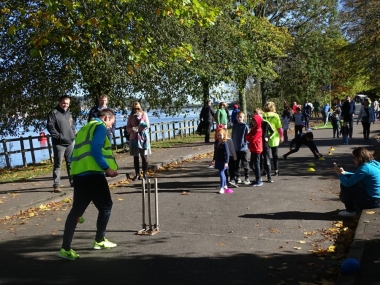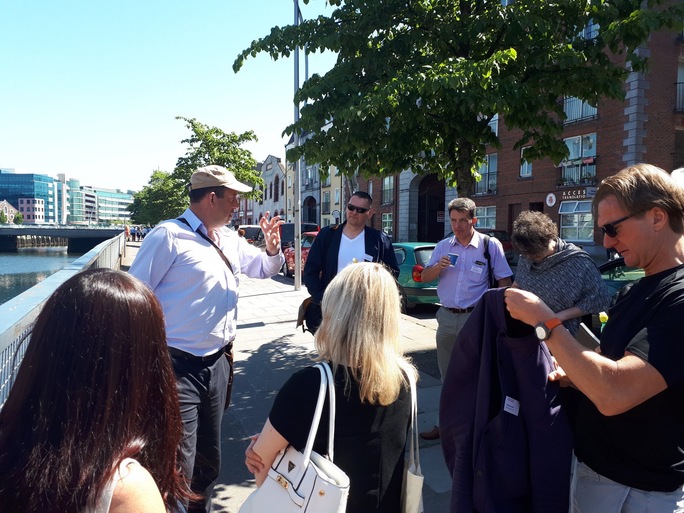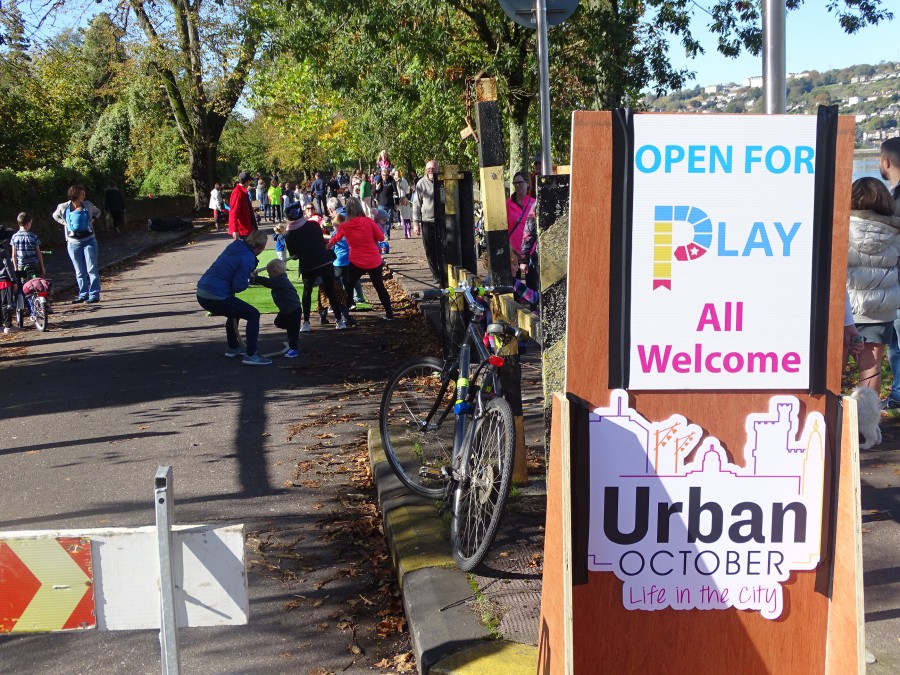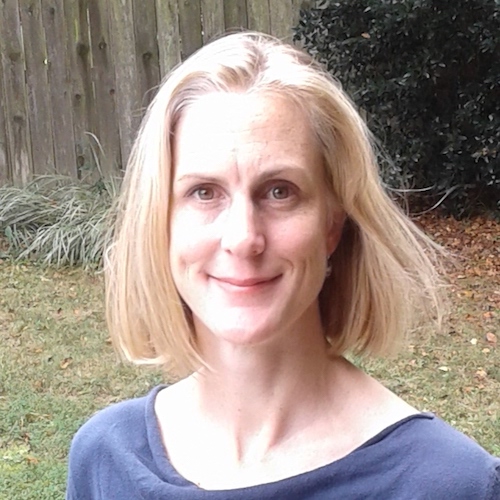If you want to do European projects, URBACT is the place to start
Edited on
02 October 2019Meet Kieran McCarthy, EU Committee of the Regions member and Cork City Councillor.

City Councillor Kieran McCarthy is a living link between the everyday challenges of his hometown, Cork (IE) – and the international machinery of European policy-making. With a PhD in Geography and a passion for local heritage corkheritage.ie, he is the Committee of the Regions (CoR) rapporteur on the EU Urban Agenda, and a strong advocate for improving Europe’s cities through practical local actions and cooperation.
As a partner in the URBACT Playful Paradigm network, Councillor McCarthy’s city organises pop-up playgrounds in places like temporarily pedestrian streets, public buildings, or empty plots – promoting inclusion, health and sustainability.
Back from a spin on his motor scooter photographing local landmarks for his latest book, Councillor McCarthy found a moment to answer our questions.
Amy Labarrière (AL) - Since discovering URBACT at the European Week of Cities and Regions, you’ve become a fan of the programme. Why?
Kieran McCarthy (KMC) - What I like about URBACT is that it’s down to earth. It’s like a stepping stone: if you want to do European projects, this is the place to start – there’s a lot of support.
I’ve been looking at the letters that make up URBACT and I know it's not an acronym, but I was thinking what the letters could stand for…
It would be the ‘U’ for about ‘Us’. It’s a citizens oriented programme. We’ve had a new bridge constructed with EU funds in our city… but more people here have heard about URBACT and Playful Paradigm than anything else.
I’d say the ‘R’ in URBACT stands for dealing with very ‘Real’ problems, even at the broader scale of EU politics.
‘B’ would be for ‘Belief’. The URBACT facilitators I’ve met over the years have a real belief that these projects are going to make a difference: “You can go home with ideas from this workshop and you can roll them out in the morning!”
‘A’ would be for ‘Action’. When people go into an URBACT project or workshop they’re working hard to figure out a problem. They return to their hometown with new ideas, vision, collboration skills... that they apply to actionable local projects. URBACT has a fantastic methodology to do that.
‘C’ for ‘Collaboration’. With the Committee of the Regions I’ve done workshops across the EU, on different themes from the Urban Agenda to the digital single market… Some cities are great at collaborating, and some aren’t. It’s not easy to bring people together round a table and suddenly say “talk !”: you need a methodology. URBACT gets people listening and learning from each other.
‘T’ could be for ‘Toolkits’- that I’m a big fan of. All the URBACT projects and toolkits are online at urbact.eu. A lot of local authorities don’t actually realise that.
Recently I was involved in a debate in my own council chamber on dereliction in the city, looking for ideas on how to reboot derelict sites: I quoted from an URBACT document, and it was published in the local newspaper.
I’m passionate about my own city, but I’ve discovered that there are other ‘Corks’ out there, second cities full of ambition and ideas. Most cities are trying to do some sort of inner city renewal, trying to fix their transport, come up with a climate change adaptation plan, get their citizens more engaged… And we’re all asking the same questions: who can we collaborate with? Who can we get ideas from?
We don’t have to do things alone: we can learn from each other! Once you’ve been involved in an URBACT project you’re going to be searching for the next one!
AL - Many cities go on to apply their URBACT-acquired skills in bigger programmes. Have you seen URBACT sparking broader EU improvements in urban development?
KMC - URBACT is one arrow in a huge quiver of arrows all advancing thinking within cities and regions, and ‘communicating Europe’. The Committee of the Regions has toolkits and analysis on themes from bio-economy to IT… There’s also the European Capital of Culture, Interreg, Horizon 2020, the European week of cities and regions, local councillors… It’s a combined effort.
AL - You were appointed to the Committee of the Regions in 2015. What was it like to jump to EU level?
 KMC - It’s been a very steep learning curve. It completely changed my life – all of a sudden you’re going from the local council to the hemicycle of the European parliament! Everyone gets their minute to speak up and influence policy. It took me a while to get into debates, and to cut through the European lingo.
KMC - It’s been a very steep learning curve. It completely changed my life – all of a sudden you’re going from the local council to the hemicycle of the European parliament! Everyone gets their minute to speak up and influence policy. It took me a while to get into debates, and to cut through the European lingo.
In Bucharest recently for the informal discussion with EU ministers on the Urban Agenda, ten minutes before the meeting I was on the phone dealing with a pothole problem, then I got out of the taxi and was shaking hands with the Vice Prime Minister of Romania!
I’m still amazed by the different perspectives the Committee of the Regions brings. And the problems they’re expressing are the same as in your country – you realise “I know this!”. That’s the good thing about the Committee of the Regions, it does give a voice to local and regional reps. I think the Cohesion Alliance has worked.
AL - What has your role been as CoR rapporteur on the EU Urban Agenda?
KMC - I did an assessment of the implementation of the EU Urban Agenda last year. Plus I looked at how we could splice some of the action plans together: housing, environment…
My role is to make sure the action plans are looked after. 12 action plans have emerged from the partnerships, 12 actions in each, so how do we actually roll out these 140 actions? In Bucharest (RO) I spoke on behalf of the Committee of the Regions on where the Urban Agenda should go. There’s a huge fear that some of these action plans may just end up on the shelf. So I’ve been calling for extra financing for implementation, and that the voices of the partnership coordinators be heard a lot more.
The heads of delegation for the Member States were positive about the Bucharest declaration - that was great. And, the German presidency want to champion this EU Urban Agenda, dusting off the Leipzig charter on urban affairs from 10 years ago!
AL - What do you see URBACT contributing to these changes in EU cities?
 KMC - Over the last 10 years we’ve seen cities and regions move on – there’s a lot more collaboration – and I think URBACT is at the heart of that debate.
KMC - Over the last 10 years we’ve seen cities and regions move on – there’s a lot more collaboration – and I think URBACT is at the heart of that debate.
Maybe there’s a political crisis at central government level, but what I’ve actually found on the ground with the Committee of the Regions is that Europe’s cities are thirsty to work together, to learn more, and there’s a bubbling underground evolution towards more citizen-led change. I think URBACT helps with that evolution. People can just open up the URBACT files and look at how collaboration works. It’s not easy but it’s really important.
I’ve seen this in my own city. Playful Paradigm brings together different city departments, but also citizens. On Cork’s marina, giant Connect 4 games were set up, tug of war... It’s empowering local residents’ associations, getting to the local people – which doesn’t always happen with macro-scale European projects. The Committee of the Regions opinions are frontiers of ideas, they’re about connections, partnerships, dialogue, unity, diversity, cross-border interoperability… but you can’t just talk about those buzzwords: we need practical projects, knowledge exchange platforms.
Collaboration breeds further collaboration – even on smaller projects like opening up a tiny street-side park. When people have fun working with each other they’ll work together again. My city is relatively small, 210 000 inhabitants, so people from Healthy Cities projects, age action programmes, refugee programmes, Chamber of Commerce, business associations… all know each other, but they might not have worked with each other before. URBACT is cross-disciplinary, it brings people together, champions citizen innovation – and you discover an electric current in the city, an energy!
***
More about Kieran McCarthy on kieranmccarthy.ie
More about the Leipzig Charter and how URBACT is refreshing Europe’s urban policy principles here.
 Submitted by Amy Labarrière on
Submitted by Amy Labarrière on




